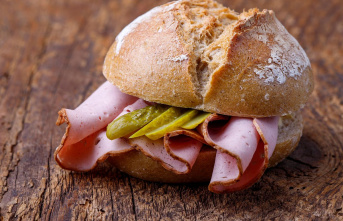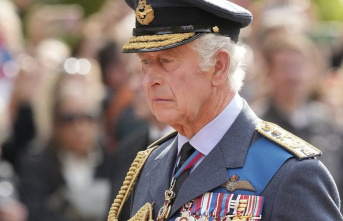For five nights and four days - until Monday morning, the coffin of Queen Elizabeth II is laid out in the British Parliament and open to the public around the clock. Hundreds of thousands of people are expected to pay their respects once again to the Queen.
If you want to say goodbye to the deceased monarch, you have no choice but to stand in a gigantic queue. According to media reports, this can take up to 30 hours, depending on how many people are queuing. On Wednesday evening, the queue from London Bridge on the south bank of the Thames led upriver to Lambeth and over the bridge of the same name to Parliament - almost four kilometers. The current endpoint can be viewed on Youtube.
But who could handle it better than the British? After all, patient queuing is considered the most British of virtues, and one that the UK prides itself on. So the British take it easy.
Mood good and benevolent
It is the same with the sisters Yvette (59) and Helen Roberts (53). As the two stroll into the evening sun under Big Ben after saying goodbye to the Queen on Wednesday evening, they are really inspired by the experience. "I don't know how long I waited," Helen said. You didn't pay attention. The two women from Bedfordshire quickly caught up in the queue. "We've made real friends," says Yvette. The atmosphere was good and benevolent - another British virtue, she thinks.
A perception that is also reflected in the atmosphere on Westminster Bridge outside Parliament, where the many people flock to leave Parliament. They stroll, chat and linger on the streets that are closed to cars. It's like the Queen has called a street party for everyone who pays their last respects.
Set in there Westminster Hall
In the venerable Westminster Hall, the atmosphere is of course different. There, people stream into the hall in two columns, passing the coffin on the right and left. Nobody is speaking. Many bow or pause as they come level with the Queen's coffin, which is laid out on a pedestal. Many people have tears in their eyes, some wipe tears from their faces, and a few sobs can be heard.
The rules are strict: no souvenirs such as flowers or teddy bears are allowed. Cell phones have to stay in your pocket. Photos or even selfies are not permitted. Even without bans, the atmosphere in the venerable Westminster Hall is awe-inspiring enough, with its mighty medieval vaulted roof and the presence of the dead monarch. Breaking the rules there would be very un-British.
Nevertheless, police officers, supervisors and, last but not least, ten soldiers from different guard units make sure that the rules are observed. The men in historic-looking uniforms who stand guard around the coffin appear frozen, not moving. They change positions every 20 minutes. A guard unit lasts a total of six long hours, during which the men have to stand motionless.
Already on the first night of the laying out there was an incident: a security guard suddenly collapsed and hit his face on the ground. Bystander guards rushed to his aid and rolled him onto his back. The BBC live stream then switched to an outside view. Nothing was initially known about the state of health of the fallen man.












